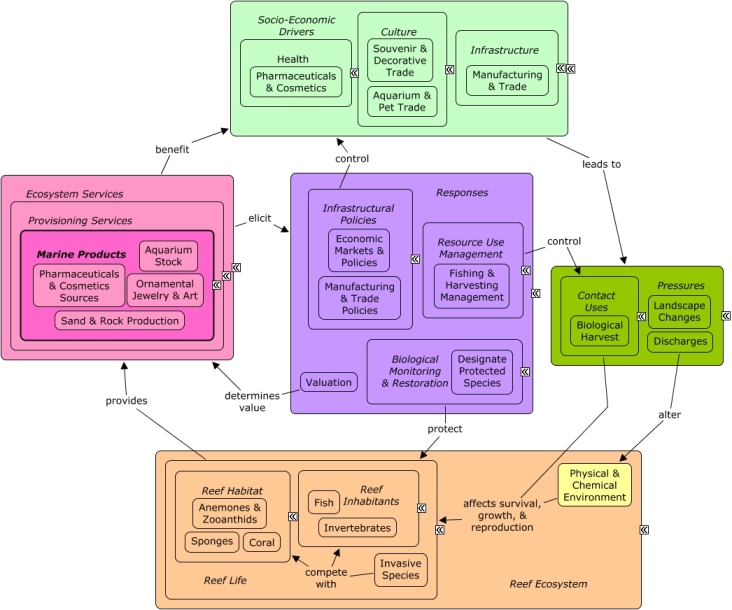ReefLink Database

Aquarium Stock
Aquarium Stock is aquatic life that humans collect for sale to commercial aquariums or individual hobbyists.
CMap

CMap Description
A number of reef-dependent organisms may be harvested or collected for development or sell as marine products. Colorful fish and invertebrates may be collected for distribution and sale in the aquarium trade. The United States (US) is the single largest importer of ornamental fish in the world, and the combined countries of the European Union are the largest market for ornamental fish. Many of the sectors that benefit from aquarium stock also create pressures on the reef ecosystem through coastal development, pollution, and harvesting. Overfishing, or accidental harvesting of non-target species, can disrupt the reef food web. Trade regulations and economic markets, including supply and demand, will influence the value of marine products. Species protections and fishing regulations can control the amount of potential stock that is actually harvested, or limit harvest of vulnerable taxa.Citations
More than 50 citations. Click here to load.
| Citation | Year | Study Location | Study Type | Database Topics |
|---|
Management Options
| Management Option | Description | Sources | Database Topics |
|---|---|---|---|
| Corporate Response: Invest & Co-finance Projects | Investing and co-financing projects that aim to conserve or restore habitats can be an effective means to preserving reef habitats as well as establishing positive working relationships between organizations. Investing in private sector projects will promote desired businesses and business practices, reducing barriers to entry and competitiveness as compared to traditional businesses and business practices to counterbalance advantages from undesired externalities. | World Bank Group. 2008. Biodiversity, Climate Change, and Adaptation. Nature based solutions from the world bank portfolio. The International Bank for Reconstruction and Development, Washington, DC. |
Aquarium Stock; Banks, Credit, & Securities; Biochemical & Genetic Resources; Biomedical Research Policies; Collaboration & Partnering; Corporate Responses; Economic Markets & Policies; Finance & Insurance; Finfish & Shellfish Stock; Food & Raw Materials; Funding & Donations; Funding & Incentives; Manufacturing & Trade; Manufacturing & Trade Policies; Marine Products; Ornamental Jewelry & Art; Pharmaceuticals & Cosmetics Sources; Provisioning Services; Resource Use Management; Tourism & Recreation |
| Economic Markets & Policy: Regulate International Trade of Reef Species | Many coral reef species are harvested internationally for a variety of markets including the aquarium trade, food, curios, jewelry and pharmaceuticals. The US is the largest importer for many of these markets. The US strictly limits extraction of stony coral and many reef species in its waters; but as a major importer and consumer of coral reef species, more actions can be taken to decrease the demand on international imports. Setting and enforcing regulations on what can be imported (such as Convention on International Trade in Endangered Species CITES) is one approach that has been taken. More information is needed, leaving room to collect trade data and assess the impacts of extraction techniques to find sustainable methods. Demand for species collected this way will be increased with greater transparency to consumers, which can be accomplished through certifications for environmentally cognoscente collectors and those using alternatives like aquaculture and coral farming. Continued participation in Asia Pacific Economic Cooperation (APEC) and International Coral Reef Initiative (ICRI) is also beneficial. | U.S. Coral Reef Task Force. 2000. International Trade in Coral and Coral Reef Species: The Role of the United States. Report of the Trade Subgroup of the International Working Group to the U.S. Coral Reef Task Force, Washington, D.C. World Resource Institute International Marinelife Alliance, editor. 1997. Sullied Seas. WRI, Washington D.C. U.S. Coral Reef Task Force. 2000. The National Action Plan to Conserve Coral Reefs. Washington, D.C. |
Accidental & Illegal Harvest; Aquaculture; Aquarium & Pet Trade; Aquarium Stock; Biological Harvest; Biological Monitoring, Mapping, & Scientific Research; Collaboration & Partnering; Coral; Corporate Responses; Cultural Policies; Designate Protected Species; Economic Markets & Policies; Environmental Education & Outreach; Invertebrate Harvest; Invertebrates; Live Collection; Manufacturing & Trade; Manufacturing & Trade Policies; Marine Products; Ornamental Jewelry & Art; Pharmaceuticals & Cosmetics; Pharmaceuticals & Cosmetics Sources; Political Pressure; Souvenir & Decorative Trade; Sponges; Stony Coral; Toxics; Wholesale & Retail Trade |
| Marine Zoning: Sanctuary Preservation Areas (SPAs) | This is a type of Marine Zoning used by the Florida Keys National Marine Sanctuary (FKNMS). SPAs focus on the protection of shallow, heavily used reefs where conflicts occur between user groups, and where concentrated visitor activity leads to resource degradation. They are designed to enhance the reproductive capabilities of renewable resources, protect areas critical for sustaining and protecting important marine species, and reduce user conflicts in high-use areas. This is accomplished through a prohibition of consumptive activities within these areas. They have been chosen based on the status of important habitat, the ability of a particular area to sustain and protect the habitat, the level of visitor use, and the degree of conflict between consumptive and non-consumptive users. The actual size and location of these zones have been determined by examination of user patterns, aerial photography, and ground-truthing of specific habitats. | NOAA Marine Sanctuary Program. 2007. Florida Keys National Marine Sanctuary revised management plan. National Ocean Service, Key West, FL. |
Accidental & Illegal Harvest; Anchoring & Vessel Grounding; Aquaculture; Aquarium & Pet Trade; Aquarium Stock; Artisanal Fishing; Beaches & Nature Parks; Biological Addition; Biological Harvest; Biological Monitoring & Restoration; Boat Movement; Boating Activities; Boating Regulations; Coastal Defense; Coastal Development; Coastal Engineering; Commercial Fisheries; Commercial Fishing Boats; Complex Habitat & Resources; Cruise Ships; Cultural Services; Decision Support; Designated Uses; Dive, Snorkeling, & Swimming Tourism; Dredging Regulations; Dredging, Draining, & Filling; Ecosystem Monitoring & Restoration; Educational & Research Opportunities; Entertainment & Accommodation Services; Environmental Monitoring & Restoration; Finfish & Shellfish Stock; Finfish Harvest; Fisheries & Hunting Policies; Fishing & Harvesting Management; Fishing Sector; Invertebrate Harvest; Landscape Changes; Large Ships; Live Collection; Marine Protected Areas; Oil & Gas Tankers; Ornamental Jewelry & Art; Permitting & Zoning; Physical Damage; Public Administration; Recreational Fishing; Recreational Opportunities; Resource Use Management; Security; Small Boats; Souvenir & Decorative Trade; Supporting Services; Tourism & Recreation; Tourism & Recreation Policies; Trampling; Travel Services & Tour Operators; Trawling & Fishing Gear Damage; Water Resources; Water Transportation |
| Monitor & Research: Biological Status and Trends Monitoring | This activity produces long-term comprehensive information on sanctuary-wide status and trends of biological resources. Data that could be collected on coral reef communities includes but is not limited to species abundance and density, biodiversity, benthic cover, coral condition, growth, recruitment, predation, and grazing. Mangroves and seagrasses should also be monitored. With adequate baseline data, changes in community structure and biocriteria can be identified and restoration or protection efforts can be taken. | NOAA Marine Sanctuary Program. 2007. Florida Keys National Marine Sanctuary revised management plan. National Ocean Service, Key West, FL. |
Algae; Anemones & Zooanthids; Apex Fish Predators; Aquaculture; Aquarium Stock; Biochemical & Genetic Resources; Biocriteria; Biological Harvest; Biological Monitoring & Restoration; Biological Monitoring, Mapping, & Scientific Research; Bivalves; Calcareous Macroalgae; Contact Uses; Coral; Coralline Algae; Cyanobacteria; Decision Support; Echinoderms; Ecosystem Monitoring & Restoration; Finfish & Shellfish Stock; Fish; Fishing Sector; Food & Energy Policies; Hydrocoral; Invasive Species; Invertebrates; Large Herbivorous Fish; Lobster, Crab, & Shrimp; Mangroves; Marine Birds; Marine Products; Marine Vertebrates; Marine Worms; Microorganisms; Molluscs; Octocoral; Octopus & Squid; Ornamental Jewelry & Art; Pathogens; Pharmaceuticals & Cosmetics Sources; Physical Damage; Primary Production; Provisioning Services; Resource Use Management; Sea Turtles; Sea Urchins; Seagrasses; Seastars; Skeletal Coral; Small Herbivorous Fish; Snails & Conch; Sponges; Stony Coral; Tunicates; Wetlands; Whales & Dolphins |
Laws
| Legal Citation | Purpose of Law | Management Organization | Database Topics |
|---|---|---|---|
| Chapter 2: Protection of indigenous, endangered and threatened fish, wildlife and plants, 12 Virgin Islands Code. | Regulates activities, including scientific research, that could affect indigenous species and species considered at risk (threatened) or endangered, establishes species of special concern and habitats that should be protected, requires permits for trimming mangroves Application to Coral Reefs:It is illegal to take or posses "live rock" which is defined as dead or live coral. It is illegaal to cut all three species of mangrove trees. Forbidding the takeing of coral directly protects coral species. Not cutting mangraoves will aid in sediment control and the removal of nutrients that could enter coral reef areas. The Commission can designate habitats for listed threatened or endangered species. Legislative Actions:It is illegal to take or posses "live rock" which is defined as dead or live coral. It is illegaal to cut all three species of mangrove trees. Forbidding the takeing of coral directly protects coral species. Not cutting mangraoves will aid in sediment control and the removal of nutrients that could enter coral reef areas. The Commission can designate habitats for listed threatened or endangered species. Comments: |
US Virgin Islands, Department of Planning and Natural Resources, Division of Environmental Protection Jurisdiction: US Virgin Islands |
Accidental & Illegal Harvest; Aquarium & Pet Trade; Aquarium Stock; Biological Monitoring & Restoration; Coral; Dive, Snorkeling, & Swimming Tourism; Environmental Monitoring, Mapping, & Scientific Research; Fishing & Harvesting Management; Invertebrate Harvest; Mangroves; Ornamental Jewelry & Art; Resource Use Management; Seagrasses; Tourism & Recreation Policies |
| Lacey Act, 16 United States Code §§ 3372 et seq. | The Act provides that it is unlawful for any person to import, export, transport, sell, receive, acquire, or purchase any fish or wildlifeor plant taken, possessed, transported, or sold in violation of any law, treaty, or regulation of the United States or in violation of any Indian tribal law whether in interstate or foreign commerce. Application to Coral Reefs:The Act makes possession, selling, transporting, importing, exporting, receiving, acquiring, and purchasing illegal under specific cases. Corals would be included. Legislative Actions:Civil Penalties up to $10,000 per each violation or maximum criminal sanctions of $20,000 in fines and/or up to five years imprisonment. All plants and animals taken in violation of the Act are subject to forfeiture as well as all vessels, vehicles, aircraft, and other equipment used to aid in the importing, exporting, transporting, selling, receiving, acquiring, or purchasing of fish and wildlife or plants in a criminal violation for which a felony conviction is obtained where the owner should have known of the illegal transgression. Comments: |
US Department of Agriculture/Us Border Patrol Jurisdiction: United States |
Aquarium Stock; Coral; Improved Technology; Ornamental Jewelry & Art; Political Pressure; Resource Use Management; Transportation Policies; Wholesale & Retail Trade |
